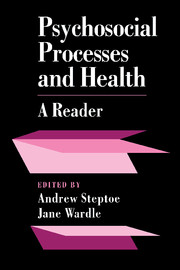Book contents
- Frontmatter
- Contents
- Preface
- Section 1 Life stress, social support and health
- Section 2 Psychophysiological processes in disease
- Section 3 Personality, behaviour patterns and health
- Section 4 Health practices and the modification of health risk behaviour
- Section 5 Coping with illness and disability
- Section 6 Behavioural interventions in medicine
- Randomised controlled trial of nicotine chewing-gum
- Conditioned side effects induced by cancer chemotherapy: prevention through behavioral treatment
- Improvement of medication compliance in uncontrolled hypertension
- Effect of psychosocial treatment on survival of patients with metastatic breast cancer
- Alteration of type A behavior and its effect on cardiac recurrences in post myocardial infarction patients: summary results of the recurrent coronary prevention project
- Can lifestyle changes reverse coronary heart disease? The Lifestyle Heart Trial
- Index
Alteration of type A behavior and its effect on cardiac recurrences in post myocardial infarction patients: summary results of the recurrent coronary prevention project
from Section 6 - Behavioural interventions in medicine
Published online by Cambridge University Press: 05 August 2016
- Frontmatter
- Contents
- Preface
- Section 1 Life stress, social support and health
- Section 2 Psychophysiological processes in disease
- Section 3 Personality, behaviour patterns and health
- Section 4 Health practices and the modification of health risk behaviour
- Section 5 Coping with illness and disability
- Section 6 Behavioural interventions in medicine
- Randomised controlled trial of nicotine chewing-gum
- Conditioned side effects induced by cancer chemotherapy: prevention through behavioral treatment
- Improvement of medication compliance in uncontrolled hypertension
- Effect of psychosocial treatment on survival of patients with metastatic breast cancer
- Alteration of type A behavior and its effect on cardiac recurrences in post myocardial infarction patients: summary results of the recurrent coronary prevention project
- Can lifestyle changes reverse coronary heart disease? The Lifestyle Heart Trial
- Index
Summary
Abstract
One thousand thirteen post myocardial infarction patients were observed for 4.5 years to determine whether their type A (coronary-prone) behavior could be altered and the effect such alteration might have on the subsequent cardiac morbidity and mortality rates of these individuals. Eight hundred sixty-two of these individuals were randomly assigned either to a control section of 270 participants who received group cardiac counseling or an experimental section of 592 participants who received both group cardiac counseling and type A behavioral counseling. The remaining 151 patients, serving as a “comparison group,” did not receive group counseling of any kind. Using the “Intention-to- Treat” principle, we observed markedly reduced type A behavior at the end of 4.5 years in 35.1% of participants given cardiac and type A behavior counseling compared with 9.8% of participants given only cardiac counseling. The cumulative 4.5-year cardiac recurrence rate was 12.9% in the 592 participants in the experimental group that received type A counseling. This recurrence rate was significantly less (p< 0.005) than either the recurrence rate (21.2%) observed in the 270 participants in the control group or the recurrence rate (28.2%) in those of the comparison group not receiving any special treatment. After the first year, a significant difference in number of cardiac deaths between the experimental and control participants was observed during the remaining 3.5 years of the study. Overall, the results of this study demonstrate for the first time, within a controlled experimental design, that altering type A behavior reduces cardiac morbidity and mortality in post infarction patients. (AM HEART J 1986; 112:653).
Persons who exhibited an emotional syndrome characterized by a continuously harrying sense of time urgency and easily aroused freefloating hostility (i.e. type A behavior pattern) were observed in 1959 to have a sevenfold greater prevalence and in 1975 a significantly greater incidence of clinical coronary heart disease (CHD) than persons not exhibiting these two emotional components (i.e., type B persons).
Ever since this observed associational relationship between the presence of type A behavior and the prevalence and incidence of clinical CHD, hundreds of studies have been designed to investigate further the nature of this association.
- Type
- Chapter
- Information
- Psychosocial Processes and HealthA Reader, pp. 478 - 506Publisher: Cambridge University PressPrint publication year: 1994



